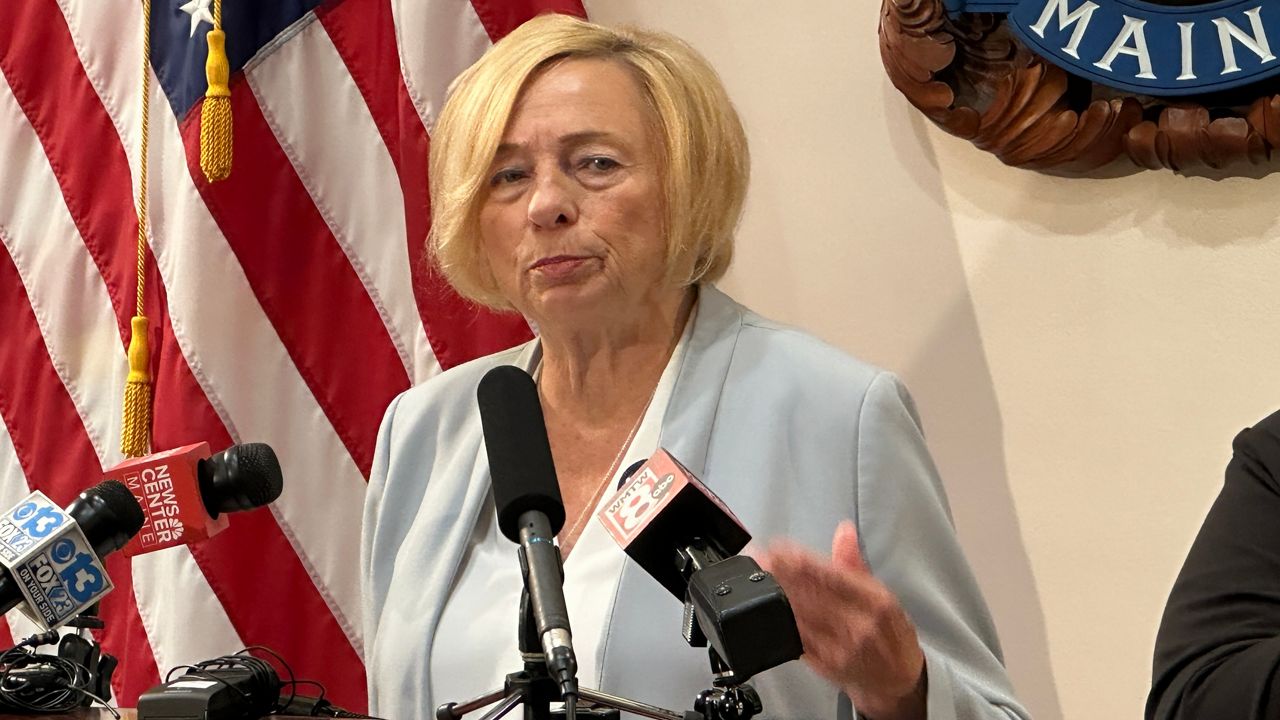Gov. Janet Mills said Friday failures by a local sheriff’s department and the Army Reserve amounted to “profound negligence” in the months leading up to the mass shooting that took the lives of 18 in Lewiston last October.
“At its core, this tragedy was caused by a colossal failure of human judgement by several people on several occasions,” Mills said during a Cabinet Room press conference. “A profound negligence, that as the commission rightly stated, was an abdication of responsibility.”
The comments are the first from Mills since the Aug. 20 release of the final report from the Independent Commission to Investigate the Facts of the Tragedy in Lewiston.
The panel of former prosecutors, judges and mental health experts did not recommend new laws or procedures in the final report, saying that’s the purview of Mills and lawmakers.
Instead, they spent 10 months investigating what happened before and after Robert Card, 40, of Bowdoin, killed 18 people and wounded 13 more in the worst mass shooting in state history.
On Friday, Mills said she wrote a letter to Defense Secretary Lloyd Austin to see if the military is implementing recommendations for better care for service members. She also expressed support for federal legislation to require the military to implement crisis intervention programs in place in most states.
Moving forward, she said she would work with the Maine State Police to see what additional funding they need to be better prepared to handle these types of situations in the future.
The state police on Friday issued its own report that identified the need for better training, more clarity on crime scene protocols when multiple agencies respond and a limit on “self-deployment,” which is when officers respond to an emergency without being called in.
Mills said several times on Friday she believes the state’s current yellow flag law is working. After the shooting, she and the Legislature amended the law to allow law enforcement to seek a warrant from a judge to take someone into protective custody and remove their weapons.
She said since the shooting, it’s been used 330 times, which is 15 times more frequently than before the tragedy.
She also outlined other steps taken, which include extending background checks to advertised private sales and increased investments in mental health care and in the Maine State Police.
Mills called the report difficult to read, but said she wanted to conduct a careful analysis before reaching any conclusions. And as she did earlier this year during her State of the State Address, she said she is intent on balancing the state’s hunting tradition with measures to protect public safety.
“Violence is not a simple problem,” she said. “Nor is the remedy a single simple measure.”
Mills began her remarks by talking about the efforts by members of Card’s family to warn police that he might be dangerous.
In May 2023, members of Card’s family told law enforcement they were concerned about changes in his behavior, including paranoia and anger. They told a sheriff’s deputy he had access to 10-15 firearms.
According to the report, two months later, while on an Army Reserve training mission in New York, he threatened a fellow reservist then locked himself in his hotel room and refused to open the door for his commanders.
They then took him to a mental health facility, which diagnosed him with psychosis and ordered that he be treated at a different hospital that could offer a higher level of care.
While at Four Winds Hospital in New York, he said he had a “hit list.” But after 19 days of treatment, the hospital determined that it did not have the legal power to require him to continue in-patient treatment.
Then in September, he punched a fellow reservist after a night at a casino, prompting his friend to text supervisors that he feared Card “is going to snap and do a mass shooting.”
The Army then asked the local sheriff’s office to conduct a welfare check on Card, but after two failed attempts, the Deputy Aaron Skolfield asked Card’s brother to secure his firearms.
The case was closed on Oct. 1 and on Oct. 25, Card killed eight people at Just-in-Time-Recreation before driving to Schemengees Bar and Grille, where he killed 10 people.
Two days later, police found Card’s body in a recycling trailer in Lisbon, dead of a self-inflicted gunshot wound.
The commission, led by former Maine Supreme Judicial Court Chief Justice Dan Wathen, found:
- That one month before the shootings, the Sagadahoc County Sheriff’s Office “had sufficient probable cause to take Card into protective custody under Maine’s yellow flag law and to initiate a petition to confiscate any firearms he possessed”
- That the Army Reserve failed to share relevant information it had about Card’s behavior
- That Army Reserve commanders failed to follow up with Card following his discharge from a mental hospital, both to ensure he continued treatment and to ensure that weapons were removed from his home.
- That despite the “utter chaos” that followed reports of the shootings, and concerns about officers who “self-dispatched” to the scenes, law enforcement found “Card’s body within 49 hours without further loss of life.”
Mills too thanked first responders and reminded Mainers that with the anniversary of the shootings coming up, everyone may be at a different place in the grieving process.
“I think it’s important to acknowledge we’re all at different points, different stages of healing,” she said. “Our state, the people of Lewiston, the families, everyone impacted. Some may still feel frustrated and angry. Some may feel scared. Some may feel grief and sadness or frozen in time watching the world move on while they live on missing the people they loved.”










